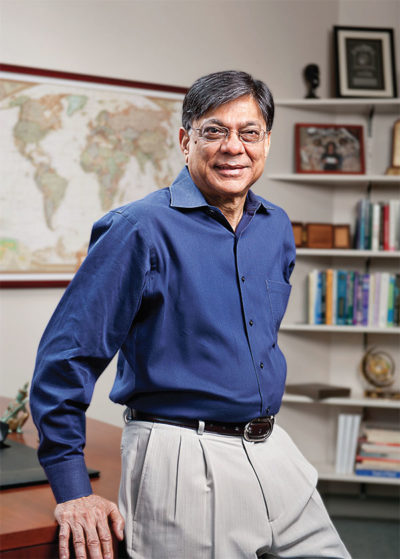Babson Global, the wholly owned subsidiary of the College, is coming out of startup mode. It was founded 3 1/2 years ago to disseminate around the world the College’s message of Entrepreneurial Thought and Action and to provide additional revenue. As provost, Shahid Ansari helped found Babson Global. To help lead the organization in its endeavors, he became its full-time CEO this summer.

Photo: Webb Chappell
Shahid Ansari, CEO, Babson Global
How is your role at Babson Global going to change?
Quite honestly, nothing will change other than the workload, which will become a lot less now that I don’t have to carry on the duties of provost and tend to Babson Global. During the last few years, Babson Global was what we call a lean startup. It did not receive any funding from the College and all activities were financed from resources we generated. Now that we are on the verge of perhaps working with the Saudi Arabia Ministry of Economy and Planning to create a new business school, it’s clear that I will no longer be able to hold down two jobs, running an existing college as well as creating a new one. So the time was right to split my job into two separate jobs.
Tell us some more about the Saudi Arabia project.
The important point is we are not creating a branch campus. Our desire is to build something for them, help them to operate it for a few years, transfer full control back to them, and then help them sustain that excellence over time. We are using what we call a Build, Operate, Transfer, Sustain model. We added the sustainability piece because we recognize that it’s important to be connected to the institution after we leave. After we leave, the excellence is hard to sustain. So we are trying to find a mechanism by which we could have a continuing engagement with our partner schools so they don’t decline over time.
How does Babson benefit from all of this?
First of all, there are reputational benefits. We have seen an increase in the number of applicants from around the world. So that’s on the student side.
In many cultures now we are regarded as a serious player in the field of entrepreneurship. We are represented in forums that we weren’t represented in before, such as the World Economic Forum. We have been invited to entrepreneurship summits that are hosted by the State Department, by the White House, by the USAID. We have requests now for help from countries that were never on our radar, like Brunei, Bahrain, China.
We have had financial benefits. The last few years we have had direct contributions of a couple of million dollars into the College. In addition we have provided close to $4 million in income to our faculty because of the opportunities to work on Babson Global projects.
But in my opinion, apart from all of that, the biggest benefit is the chance to learn. As we have designed things for others, we have learned a lot ourselves. This work has provided Babson with a live lab worldwide to try out things and, if they work, bring them back to us. It’s informing our curriculum design and our organizational design.—Donna Coco
